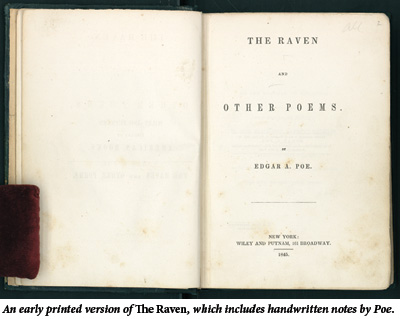Dark Inspiration

I can’t think about Edgar Allan Poe without thinking about my life, because he was there in dark spirit, in my room and in my head. He was out there in the shadows of the East Texas pines, roaming along the creeks and the Sabine River, a friendly specter with gothic tales to tell. It was a perfect place for him. East Texas. It’s the part of Texas that is behind the pine curtain, down here in the damp dark. It’s Poe country, hands down.
These thoughts were in my mind as I toured the Harry Ransom Center’s current exhibition, From Out That Shadow: The Life and Legacy of Edgar Allan Poe. The Center, at the University of Texas at Austin, is celebrating the bicentennial of Poe’s birth with an exhibition that includes original manuscripts and illustrations. Looking at these artifacts, it occurred to me that Poe reached out from the grave and saved this East Texan from the aluminum chair factory. I know there are those who will say working in an aluminum chair factory is good honest work, and I’m going to agree. But I will say without hesitation and with no concern of insult that it damn sure wasn’t work of my choosing, and that it takes the skill of a trained raccoon and the I.Q. of a can of green beans, minus the label, to get it done.
Like Sisyphus forever rolling his rock uphill, I feared I would spend my time on Earth matching up aluminum runners, or linking chain to be pinned together by hissing and snapping and cutting and crimping machines, which in turn would be forklifted away in shiny piles of bent rods and flexible seats. Something to be sold and brought out on hot days at barbecues, and on hot nights to give mosquito-attacked, beer-drinking drive-in theater patrons a place for their butts to nestle.
I did all manner of work after that, some of it even less pleasant, actually, but it was that factory, the trapped tedium and uniformity of it all, that has stayed with me like a scar. Again, it’s good honest work like digging a ditch or filling condom machines in gas stations, but even to this day, I have bad dreams of the aluminum chair factory, like some kind of horrid, slinking, saliva-dripping imp, clanging and cutting and crimping, and tugging at my soul. When it tugs, I can feel my spirit move inside my head. I feel it being slowly drawn away, and I awake thinking my life as a writer has all been a dream. That now it’s time for me to get up and pull on my clothes and go to work and make lawn furniture.
 But it’s only a dream, because Poe, bless his little crazy heart and messed-up mind, like some kind of superhero came to save me. Climbed up out of the grave and swooped out from the darkness and stuck his shadow in my head and gave me something to hide beneath and something to investigate. His shadow had been with me before, when I was kid, but during my time in the factory I had lost it for a while. When it came back, it came back with a dark, wing-flapping vengeance, and brothers and sisters, glory hallelujah, as the church folks say, I was set free.
But it’s only a dream, because Poe, bless his little crazy heart and messed-up mind, like some kind of superhero came to save me. Climbed up out of the grave and swooped out from the darkness and stuck his shadow in my head and gave me something to hide beneath and something to investigate. His shadow had been with me before, when I was kid, but during my time in the factory I had lost it for a while. When it came back, it came back with a dark, wing-flapping vengeance, and brothers and sisters, glory hallelujah, as the church folks say, I was set free.
Let me explain.
When I was a boy growing up in East Texas, from first grade to fifth, I lived in a town with about 100 people. It was a fun thing for a child in many ways. I lived a kind of Huck Finn existence, except I got to go home to a loving family when I tired of the woods and creeks and bicycle rides. But without those things, I found the world where I lived somewhat empty. It was as if everything was painted gray, and there was very little shading; it was flat gray, like the walls of a prison, inside and out.
But there were little bits of hope. There were comics, bright and shiny and rich in action, all in color for a dime. And there were books, which gave me strange new worlds and all manner of adventure, and then there was Poe.
My family was a poor one. My father couldn’t read or write and my mother had an 11th-grade education, but she was a reader. And when I was a very young boy, she handed me a book of horror and detective tales by Poe.
That book darkened and shaded the gray around me, gave me velvet shadows that quivered at the bottom of my dreams. They thrilled me so deeply I often awoke with such an intense feeling of excitement and fascination that I would walk about my room for hours in an overstimulated stupor, stopping weak-kneed to grab a pen and paper to try to write down my own stories of wicked doings and dark designs. He was the first author to do that for me. There was something so strange about his work, yet so inviting and satisfying. For a long time, Poe owned me.
At the Ransom Center, I read that he liked the night and dark places. I almost let out a whoop, because I’m much the same way. I live a more balanced life, no drunken forays and drugged nights, and I like the day better than Poe, but when I write during the day, I like it dark. I like the shades drawn. I love sitting in darkness and reading with only one light on. I like rain and grim skies and an atmosphere that creeps with possibilities dark and forlorn.
Perhaps this is because I read Poe at an early age, or perhaps it was because he was a kindred spirit: someone who felt better clothed in shadows and mystery, someone who liked a world of twisted logic and bizarre puzzles, and found it more interesting than day-to-day dealings, discussions of the weather and the position of the Yankees or the Cowboys in the World Series or Super Bowl.
I’m not one of those who thinks Poe’s drinking, depression and drug use contributed to his writing and made it better. I believe he wrote to escape these personal demons. Poverty was another problem he had, another thing from which he wished to escape, and when I was a kid, and in fact until I was in my middle 20s, it was part of my daily existence as well. Sometimes, to escape the thought of pockets full of lint and no change, it was necessary to enter into a world where anything was possible. A world of one’s own creation. But to do so, others had to show you how to open the doors and give you a bit of furniture here and there. They had to tease you into coming over to their side and looking around inside their house.
 Writers as diverse as Kipling, Tennessee Williams and H.P. Lovecraft, his greatest disciple, have acknowledged their debt to Poe. He moved through their writings like an apparition. His shadow is large, and it’s changeable. He wrote detective stories, invented them for that matter. He wrote horror stories, and stories of the psychologically weird and the grotesque, as well as stories of dark humor. He wrote a little bit of everything, including love poems, provided you like your love dark and dank and dead.
Writers as diverse as Kipling, Tennessee Williams and H.P. Lovecraft, his greatest disciple, have acknowledged their debt to Poe. He moved through their writings like an apparition. His shadow is large, and it’s changeable. He wrote detective stories, invented them for that matter. He wrote horror stories, and stories of the psychologically weird and the grotesque, as well as stories of dark humor. He wrote a little bit of everything, including love poems, provided you like your love dark and dank and dead.
As a person, Poe was so acidic and unpopular, even his literary executor tried to destroy his reputation. But his talent remains, vibrant and as influential as ever. Not even his literary executor could drown that. Poe may go down deep for a while, pushed there by fashion and critics, but he floats. He bobs up. He’s always there to remind us of his dark genius. He may be the most influential American writer ever, and maybe one of the most influential in the world. He had such impact on the world of literature that awards are named after him, comics are drawn depicting his work, and there is even an action figure of Poe, minus the kung fu grip. Take that, Dostoevsky!
And this brings me back to the aluminum chair factory and his influence. Yeah, that’s right. I’m never far away from the aluminum chair factory.
I thought of his stories while I worked, carrying rods, or racking links, or holding my foot on a pedal that made a machine hiss, thump and bind. I thought of his stories until I could hear the beating of Poe’s Tell-Tale Heart beneath my feet. See his black cat out of the corner of my eye. Imagine a wall freshly bricked up with a man scratching at it from the other side. He helped me get through my shifts. He was there, and he’s here now, with me most mornings when I write. He is stronger than the aluminum chair factory. He was a fate-changer for me, and I love him for it.
Thank you, Edgar Allan Poe, for saving me from a fate that would have been a premature burial the length of my life.
Thank goodness Poe was correct when he wrote: “the boundaries which divide Life from Death are at best shadowy and vague. Who shall say where the one ends and where the other begins.”
Anyone with a creative spark knows what that means. And anyone of a creative spirit is thankful for it. It gives us a place to go that isn’t contained and bound in the plain gray wrapper of our flesh.
Thank you, Edgar Allan Poe.
Joe R. Lansdale lives in Nacogdoches, Texas, where he writes novels, short stories, screenplays and other works. His latest novel is Vanilla Ride, Random House.


